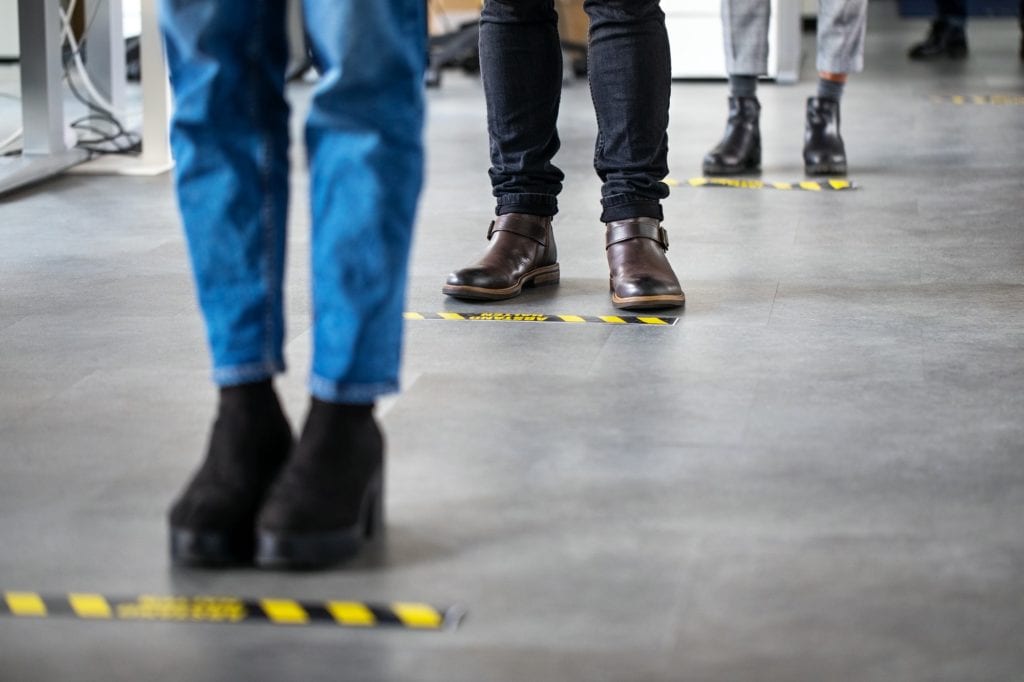There’s a lot of coronavirus information coming our way. And, aside from everyday changes, this information sometimes seems both conflicting and unclear.
Despite all the misinformation, rhetoric, and opinion that fill our news feeds, the science behind preventing and spreading any illness or infection is quite simple and comes down to choice. The next time you’re overwhelmed by what you should and shouldn’t do, just remember the 3Ws of COVID-19 prevention:
- Wear your mask
- Wash your hands
- Watch your distance
Choosing to do these three simple things will help you and your loved ones stay healthy and safe as we face these extraordinary times together.
Wear Your Mask
COVID-19 spreads from person to person by droplets that become airborne when a person coughs, sneezes, talks, or raises their voice. These droplets can then be inhaled or absorbed by other people within a few feet. That’s why it’s so important to wear a face covering.
You may think you’re wearing a mask to protect yourself, but you’re actually protecting others. Whether or not you’re showing symptoms, you can be a carrier of the virus.
Cloth face coverings are now widely available, so try to use a cloth mask in public instead of surgical masks. N95 respirators or other personal protective equipment (PPE) should be reserved for health care workers and first responders.
Additionally, how you wear your mask is just as important as why you’re wearing it. Here are some tips for ensuring you’re wearing yours correctly:
- Wash your hands before you handle your mask.
- Place the mask over your nose and mouth and secure it under your chin.
- Make sure it’s a snug fit against the sides of your face.
- Don’t put it around your neck or on your forehead.
Wash Your Hands
Washing your hands is one of the best ways to prevent the spread of COVID-19. And it’s scientifically proven, which is why you hear about it so often.
Here’s the most effective way to wash your hands, especially now:
- Get your hands wet with clean, warm running water and add soap.
- Rub your hands together to lather the soap and spread it to the backs of your hands, between your fingers and under your nails.
- Scrub your hands for at least 20 seconds (or the time it takes to sing the “Happy Birthday” song twice).
- Thoroughly rinse your hands under clean, running water and dry them using a clean towel or air dryer.
If soap and water aren’t available, an alcohol-based hand sanitizer can remove germs on your hands, too. Use a similar technique: apply the gel to the palm of your hand and rub your hands together for 20 seconds or until the gel dries.
It’s recommended you wash your hands:
- Before eating or preparing food
- Before touching your face
- After using the restroom
- After leaving a public place
- After blowing your nose, coughing or sneezing
- After handling your mask or face covering
- After changing a diaper
- After caring for someone sick
- After touching pets or other animals
It’s also important to keep frequently touched surfaces clean, especially shared common areas at home and at work.
It’s recommended you disinfect these surfaces every day:
- Desks
- Doorknobs
- Handles
- Keyboards
- Light switches
- Phones
- Remote controls
- Sinks
- Tables
- Tablets
- Toilets
- Touch screens
Watch Your Distance
COVID-19 spreads from people in close contact, usually within six feet. That’s why you should try to avoid crowded places and gatherings where it may be hard to stay at least six feet away from others.
If you have to go out, plan ahead. Call first to see if there are restrictions in place to help you keep your distance from others. When you’re out, pay close attention to tape markings on the floors or signs on the walls that help you stay six feet from others. Try to allow others the same space when you pass by them.
Outdoor activities are generally safer than indoor ones. Take a walk or a bike ride in your neighborhood or other safe location where you have more control over your distancing.
If you live in shared housing or share common spaces with others, social distancing can be challenging. Here are a few ideas:
- Limit the number of people in common areas at one time by staggering schedules.
- Quarantine yourself to your bedroom and have meals delivered if you’re sick.
- Don’t share dishes, drinking glasses, cups, or eating utensils. Use paper plates and plastic, disposable utensils.
- Be mindful of sink areas. Avoid placing toothbrushes and other items directly on counter surfaces.
One thing is certain: anyone can get COVID-19. Older adults and people with an underlying condition need to be especially careful since they can develop more serious complications if they have the virus.
There are a wide range of symptoms related to COVID-19. These symptoms can be mild or severe and usually appear within 2-14 days of exposure.
Common symptoms include:
- New or worsened congestion or runny nose
- Cough
- Diarrhea
- Fatigue
- Fever or chills
- Headache
- Muscle or body aches
- Nausea or vomiting
- New loss of taste or smell
- Shortness of breath or difficulty breathing
- Sore throat
Other symptoms can be more severe. Call 9-1-1 right away if you or someone you love experience any of these symptoms:
- Bluish lips or face
- Confusion
- Constant pain or pressure in the chest
- Trouble breathing
- Trouble waking up or staying awake
When you choose to wear your mask, wash your hands, and watch your distance, you help contain this global emergency and keep yourself – and others – safe.
